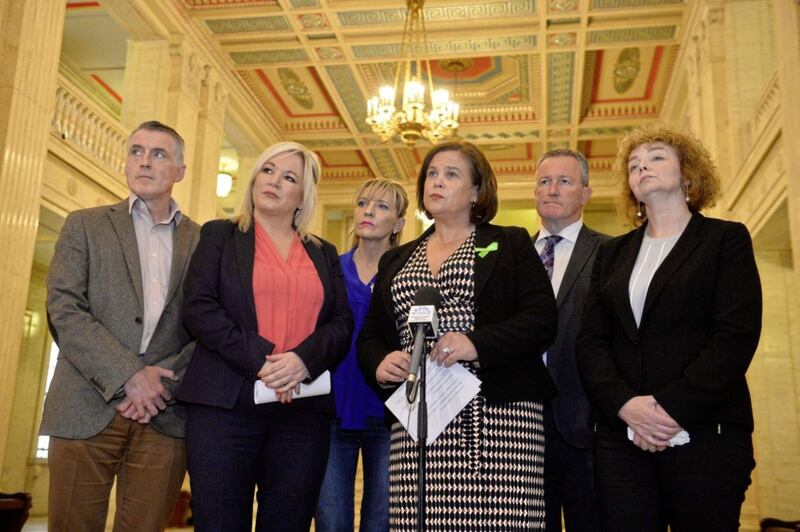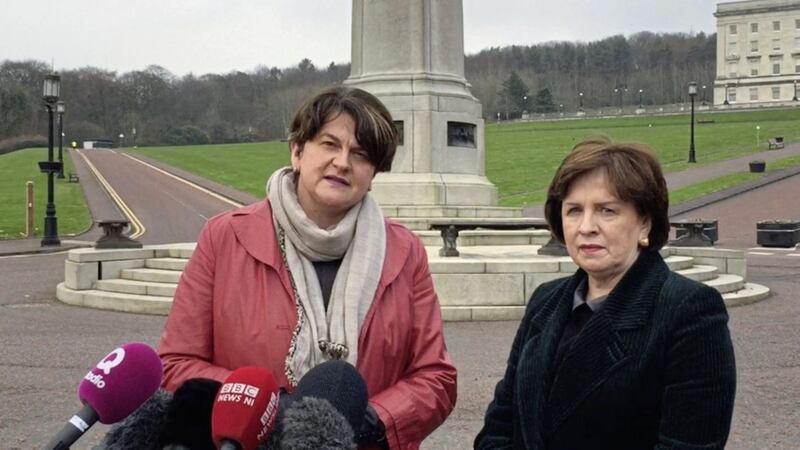After both the UTV and BBC Leaders' Debates earlier this week I noted: 'I'm not picking up any evidence of the harmony and civility they'll need for the new talks process beginning on December 16.'
Niall Robb, a PhD student at QUB, responded on my Twitter timeline: 'I don't buy that harmony and civility are prerequisites to a functioning Executive - I don't remember much harmony and civility from 2007-2017, but they still managed to work together.'
It's a point I have heard before. Indeed I've often been told that it is not necessary for parties to like each other in order to govern together. And yet, when I look at the huge mountain of problems and the sheer scale of dysfunction which have become apparent since the Assembly collapsed in January 2017, it strikes me that the roots of the problems and dysfunction probably lie in a lack of civility and harmony, particularly between the DUP and Sinn Féin.
I agree, though, that it is not necessary for Executive parties and key players in those parties to actually like each other. I have spoken to enough of those players since 2005 (when SF and the DUP were at the early stages of nudging towards their power-sharing deal in 2007) to know that only a very few of the personal relationships came even close to being describable as genuinely 'friendly.' But in the absence of basic civility and harmony it is impossible to establish the genuine cooperation and collectivity which must be the bedrock of power-sharing.

And, as I've been banging on about for years, in the absence of a power-sharing administration into which everyone has fully bought it will remain - as it has been for years - impossible to resolve rather than sideline problems. So the mountain grows, the silo approach to government (each minister prioritises the policies of their own party) continues, distrust festers, electoral polarisation widens and the chances of another collapse increase.
What was interesting about both of the debates was that the main blows were traded between the UUP and DUP and between SF and the SDLP. But SF (represented both times by Michelle O'Neill) and the DUP (represented by Emma Little Pengelly and then Jeffrey Donaldson) tended not to aim punches at each other. Does that tell us something? I'm not sure. Some observers suggest that it means that both parties are 'up' for a new deal before the January 13 deadline. The NIO (which could, of course, have a new secretary of state on Monday) and Tánaiste Simon Coveney (who will be at Stormont to oversee the new round) are making optimistic noises. But they would, wouldn't they?
In February 2018 the prime minister and taoiseach were lined up to do the rubber-stamping photo-opportunities for a deal that never happened. Even when the supposed breakthrough was announced I was very sceptical. That scepticism - and I know this will shock all of you - is still there. Michelle O'Neill says that an Irish Language Act (ILA) isn't 'an either, or' thing for her. Jeffrey Donaldson says it isn't 'a priority' for the DUP. I don't see either of those positions budging anytime soon.
I don't see the DUP agreeing to suspend the petition of concern (PoC) veto and allowing an ILA to go to a vote in the Assembly. And nor do I see SF agreeing to suspend the PoC so that the DUP can block EU issues they don't like. I was also interested to hear both UUP leader Steve Aiken and Donaldson suggest that direct rule was the preferred option if the talks ended in deadlock. O'Neill ruled it out. And if SF continues to demand a border poll in almost every press release, while also urging the Irish government to establish mechanisms for discussing and preparing for Irish unity, I don't see how any sense of stability can be established to bolster a new Executive.
At the time of writing the ballot boxes haven't even opened, so I have no idea what the political landscape will look like when you read this on Friday. The results will obviously have an impact on the talks and if Johnson wins by a comfortable majority and confirms his intention to push his present Withdrawal Agreement through Parliament then maybe, just maybe, there will be some sort of meeting of minds between the local parties. But I'm not holding my breath.








